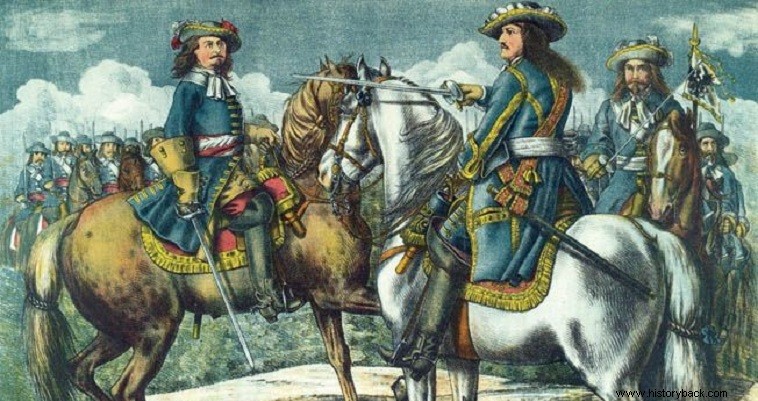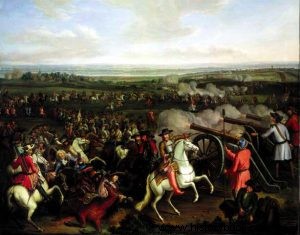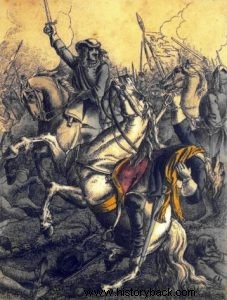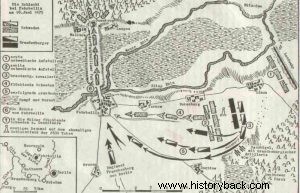
The Battle of Ferbelin is not particularly well known. It was a small-scale conflict between the armies of a superpower of the time, Sweden, and a superpower-to-be, the Duchy of Brandenburg, the future Prussia. However, the battle had enormous political significance and not without reason June 18, 1675 is considered the birthday of the new Prussia and of Prussian and German militarism in general.
Sweden and Brandenburg were allies for many years. But when the French king Louis XIV attacked the Dutch, the Elector of Brandenburg Frederick William sided with the Habsburg emperor and sent his army to fight the French opponents of the Holy Roman Empire of the German Nation (Reich).
Louis then persuaded the Swedes, paying large sums, to attack Brandenburg so that the Prussians would be forced to leave the empire. Indeed the Swedes attacked and with little resistance took possession of a large part of the duchy. The news reached the elector in December 1674.
He immediately decided to move as quickly as possible against the invaders. So it happened. Leaving all the transports and most of his infantry behind Frederick William achieved a feat for the time, covering 250 km in two weeks reaching Magdeburg. The speed, by the standards of the time, of the Prussians surprised the Swedes.
Ratenov
After minor operations, the elector ordered his commander-in-chief, Marshal Georg von Derflinger, to recapture the Swedish-held town of Rathenow. The elector ordered a loyal rich resident of the city to invite the Swedish officers to dinner and make sure that they drank a lot... So it happened and on the evening of June 14 the Prussians set out.
Derflinger had only 8,000 men of which 7,000 were cavalry and dragoons (mounted infantry at that time). Luck helped the Prussians as a sudden, powerful, summer storm had broken out. The 69-year-old Austrian Protestant Derflinger who spoke Swedish as he had fought with the Swedish army, approached the city gate and convinced the guards that he was Swedish!
His guards opened the gate and immediately 1,000 Prussian dragoons rushed in and stormed the gate. The other Prussian soldiers followed. The Swedish officers were captured drunk and the entire garrison surrendered without a shot being fired!
When the Swedish commander, the experienced general Waldemar Wrangel, learned of the fall of the city, he retreated with the rest of his forces to the area of Havelberk, an area full of marshes and small tributaries of the Havel River. From there he retreated further east to Ferbelin.
Crisis time
Pursued by the Prussians, whose strength he did not know, Wrangel found himself before the ruined bridge of Havel's tributary, the Rhine, at Ferbelin. To the right and left of the bridge were marshes. In front were the Prussians. Having no other choice he decided to accept the battle Derflinger offered him with the river at his back. Wrangel ordered his pioneers to repair the bridge in order to escape.
He had 11,000 and 28 guns against 7,000 Prussians with 13 guns. After all, the Swedes had the reputation of being invincible and the name of their great king Gustavus Adolphus still scared the Germans. Derflinger saw that regularly the Swedes were in trouble as the terrain did not allow them to develop their superior forces. He lined up his guns on a small adjacent hill and ordered "Fire".
Around noon on June 18, the Prussian guns gave the signal to begin the battle. Wrangel attempted to silence the Prussian artillery by attacking the hill but was repulsed by the Prussian cavalry. As if that wasn't enough, led by Elector Frederick William himself, the Prussian cavalry counterattacked and routed the previously undefeated Swedish cavalry.
They then routed a Swedish infantry regiment. In the meantime the Swedish pioneers had tentatively repaired the bridge and Wrangel managed to withdraw most of his men northward under cover of the falling night. This was helped by the elector's refusal to bombard the city through which the Swedes were leaving. He did not want to kill his subjects.
The victorious Prussians had about 500 killed and wounded. Swedish losses were slightly higher – about 600 to 700 killed, wounded and captured. His losses multiplied in the following days due to the Prussian pursuit but also the ambushes of the Prussian peasants who did not forget the destruction and looting that the Swedes committed during their invasion. At least 1,500 Swedes were lost in the next two days.
By July 2 there was not a living, uncaptured soldier on Prussian soil. The Prussian victory at Ferbelin had no catalytic political consequences. But it had enormous psychological effects, shattering the myth of Swedish invincibility and giving rise to Prussian military pride that had not existed until then. A few years later the army that won at Ferbelin would dominate the European battlefields during the War of the Spanish Succession, the Silesian Wars, the Seven Years' War, turning little Prussia into a "New Sparta" and a major European power.



